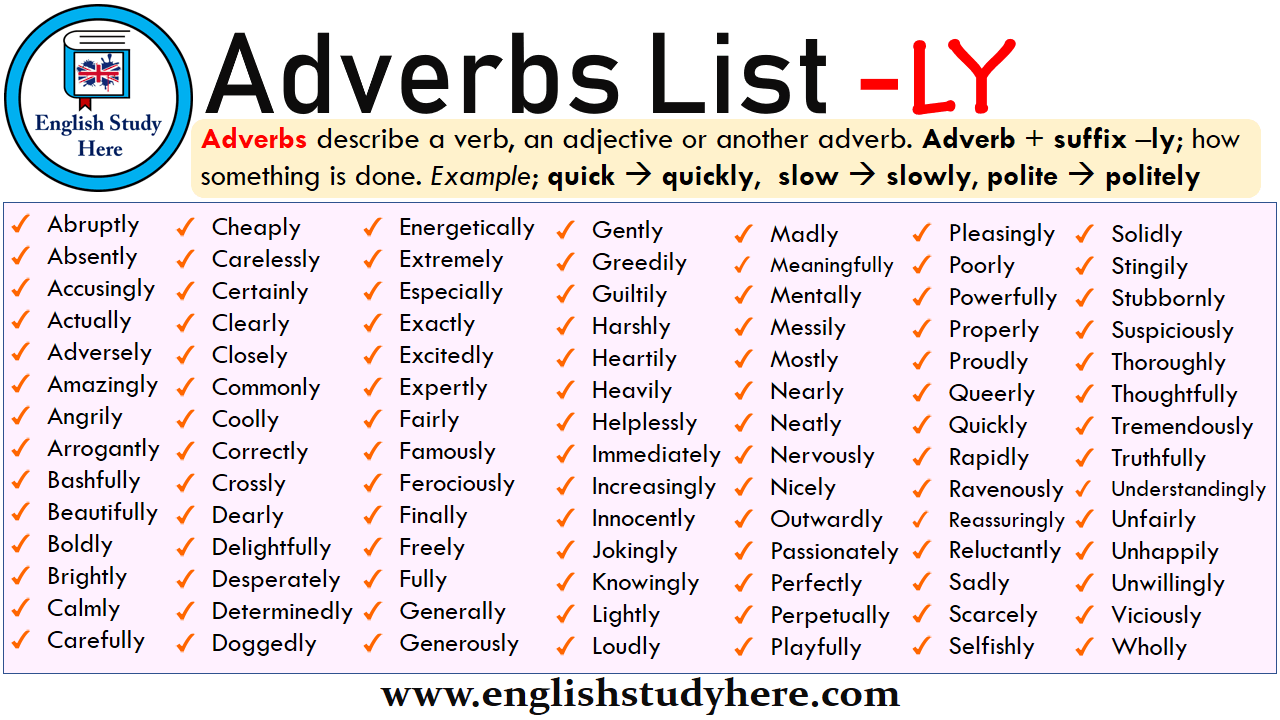Angrily, happily, easily, sadly, rudely, loudly, fluently, greedily, etc. Drive the car fast if you want to catch the flight. An adverb is a word/a set of words that modifies verbs, adjectives, and other adverbs.it tells when, where, and how an action is performed or indicates the quality or degree of the action. They add more details, like time, location, reason, condition, degree, concession, and manner. A word that describes the manner of an action is called adverb of manner.

Adverb of manner (how) an adverb of manner tells us how an action occurs.
Drive the car fast if you want to catch the flight. The adverb "loudly" in the 2nd sentence modifies the verb "sing" by giving us more information that the song is being sung in a loud voice. They help the reader gain greater insight into the way a written scene is playing out. For example, it is possible to walk or run at different speeds. Such a word is called an adverb. A clause must contain a subject and a verb to be complete. An adverb clause isn't just any group of words, however. But "feel" isn't just any verb; Examples of adverb of manner: Adverbs of manner describe how something happens. Contrast, purpose, cause, effect, comparison, time, place, manner, and condition. Drive the car slowly unless you want to die. Adverb clauses modify the independent clause in a sentence.
Because "feel" is a verb, it seems to call for an adverb rather than an adjective. They help the reader gain greater insight into the way a written scene is playing out. A word that describes the manner of an action is called adverb of manner. An adverb would describe how you perform the action of feeling—an adjective describes what you feel. Drive the car fast if you want to catch the flight.

"i feel badly" means that you are bad at feeling things.
Adverb clauses are different from phrases, which do not require a subject and a verb the way a clause does. A clause must contain a subject and a verb to be complete. Drive the car fast if you want to catch the flight. Contrast, purpose, cause, effect, comparison, time, place, manner, and condition. The words used to describe walking or running at different speeds (quickly or slowly for example) are excellent examples of adverbs of manner. Will you come quietly, or do i have to use earplugs? Because "feel" is a verb, it seems to call for an adverb rather than an adjective. Examples of adverb of manner: Adverbs of manner describe how something happens. Adverb of manner (how) an adverb of manner tells us how an action occurs. An adverb would describe how you perform the action of feeling—an adjective describes what you feel. They help the reader gain greater insight into the way a written scene is playing out. 24.2.2020 · adverb clauses (adverbial clauses) are groups of words with a subject and a verb that function as adverbs.there are many different types:
An adverb clause should not affect a sentence's grammar. They add more details, like time, location, reason, condition, degree, concession, and manner. Drive the car slowly unless you want to die. An adverb clause also begins with a subordinating conjunction, such as after, if, because and although.if you see a group of words in a sentence that acts like an adverb but does not have both a subject and a verb, it's an adverb phrase. Examples of adverb of manner:

As you read the following adverb clause examples, you'll notice how these useful phrases modify other words and phrases by providing interesting information about the place, time, manner, certainty, frequency, or other circumstances of activity denoted by the verbs or verb phrases in the sentences.
An adverb clause isn't just any group of words, however. As you read the following adverb clause examples, you'll notice how these useful phrases modify other words and phrases by providing interesting information about the place, time, manner, certainty, frequency, or other circumstances of activity denoted by the verbs or verb phrases in the sentences. A clause must contain a subject and a verb to be complete. An adverb would describe how you perform the action of feeling—an adjective describes what you feel. They help the reader gain greater insight into the way a written scene is playing out. An adverb clause should not affect a sentence's grammar. 24.2.2020 · adverb clauses (adverbial clauses) are groups of words with a subject and a verb that function as adverbs.there are many different types: Adverbs of manner describe how something happens. An adverb clause also begins with a subordinating conjunction, such as after, if, because and although.if you see a group of words in a sentence that acts like an adverb but does not have both a subject and a verb, it's an adverb phrase. They add more details, like time, location, reason, condition, degree, concession, and manner. The adverb "loudly" in the 2nd sentence modifies the verb "sing" by giving us more information that the song is being sung in a loud voice. Angrily, happily, easily, sadly, rudely, loudly, fluently, greedily, etc. Examples of adverb of manner:
Adverb Of Manner / Frequency Adverbs Boardgame / Adverb of manner (how) an adverb of manner tells us how an action occurs.. Contrast, purpose, cause, effect, comparison, time, place, manner, and condition. Angrily, happily, easily, sadly, rudely, loudly, fluently, greedily, etc. An adverb clause also begins with a subordinating conjunction, such as after, if, because and although.if you see a group of words in a sentence that acts like an adverb but does not have both a subject and a verb, it's an adverb phrase. An adverb would describe how you perform the action of feeling—an adjective describes what you feel. An adverb is a word/a set of words that modifies verbs, adjectives, and other adverbs.it tells when, where, and how an action is performed or indicates the quality or degree of the action.